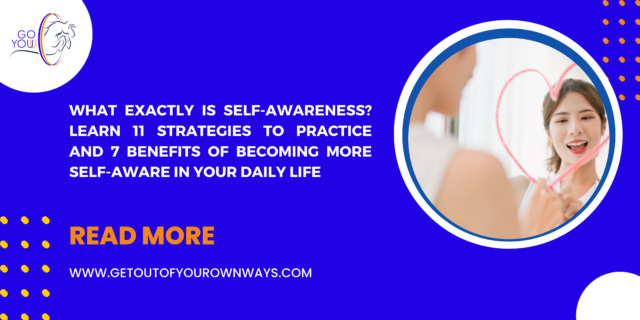Being assertive in your personal relationships is crucial for maintaining healthy relationships. More importantly, it is important for your wellbeing as you can communicate your needs and boundaries effectively.
Assertiveness is a communication style that allows us to express our needs and opinions in a clear, direct, and respectful manner. In personal relationships, being assertive can help us to get our needs met without resorting to aggression or passive behaviour.
It is not always easy to be assertive especially when our self-esteem is low, others are demanding and the pressure from family traditions and societal norms are high. We can find it very difficult to say ‘No’ and put ourselves first for fear of upsetting the other person or being rejected. However, you owe it to yourself and your mental health to put yourself first.
It’s time to start this journey to empower yourself by becoming more assertive. It’s time to get out of your own way. Your future self will love you for the effort you put into this now.
Here Are 9 Ways To Be Assertive In Personal Relationships
1. Understand the Importance of Assertiveness
Assertiveness helps you to express yourself in a clear, direct, and honest manner. When you are assertive, you are more likely to get your needs met, and your feelings respected. In contrast, if you are passive, you might not get your needs met, and if you are aggressive, you might alienate the other person.
2. Identify Your Needs
Before you can express your needs, you need to know what they are. Take some time to reflect on your needs in your personal relationships. What do you want from your partner, friend, or family member? Do you need more time, attention, or affection? Once you have identified your needs, you can communicate them assertively.
3. Set Boundaries
Being assertive also means setting boundaries. Boundaries are limits that you set on what you are willing to accept or tolerate in your relationships. For example, if your friend is always canceling plans at the last minute, you might set a boundary by telling them that you need more notice if they want to cancel. Setting boundaries shows that you respect yourself and your needs, and it helps the other person understand what you are willing to accept.
4. Be Clear and Direct
Be clear and specific about what you want and need in your relationship. This can help you communicate your request more effectively and help the other person understand what you’re asking for. Don’t beat around the bush when expressing your needs. Say what you mean and mean what you say.
5. Be Confident in Speech and Body Language
Speak confidently and maintain eye contact when you are communicating your needs. Believe in yourself and your worth. Your body language can communicate as much as your words. Use confident body language when expressing your needs. Stand tall, make eye contact, and speak in a clear and firm tone.
6. Use “I” Statements
When expressing your needs, it’s important to use “I” statements instead of “You” statements. Using “I” statements helps you take responsibility for your feelings and avoids blaming the other person. It also makes it more likely that the other person will listen to you and understand your perspective. For example, instead of saying “You never listen to me,” say “I feel unheard when you interrupt me.” This approach is less accusatory and more likely to be well received. Another example, say “I feel hurt when you cancel our plans at the last minute” instead of “You always cancel our plans at the last minute.” Final example, instead of saying, “You never listen to me,” say, “I feel like I am not being heard when I talk to you.”
7. Be Respectful
Assertiveness is not about being aggressive or rude. Be respectful of the other person’s feelings and needs. Use a respectful tone and avoid blaming or attacking language.
8. Use Active Listening
Assertiveness is not just about expressing yourself; it is also about listening to the other person. When the other person speaks, practice active listening by paying attention to what they are saying, acknowledging their feelings, and asking questions to clarify their perspective. Active listening shows that you respect the other person’s point of view, and it helps you build a stronger connection with them. Listen to the other person’s response and validate their feelings. Repeat back what they have said to ensure that you have understood their perspective and work towards finding a solution that works for both of you.
9. Practice Self-Care
Take care of yourself and your own needs. Set boundaries and prioritise your own well-being. Assertiveness can sometimes feel uncomfortable or even scary, especially if you’re not used to standing up for yourself. Being assertive can be challenging, especially if you’re used to being passive or aggressive. Take breaks when needed, engage in activities that bring you joy, and seek support from friends, a life coach or therapist if necessary.
What To Do When Others Don’t Want You To Change?
Of course, the other person might resist this new assertive change in you because they are currently getting the better deal. Remember that! Also, if you have been labelled or known as the ‘giver’, ‘obliger,’ ‘you give the shirt of your back’, it will take time to change people’s behaviour and unrealistic expectations towards you. As you become more assertive, others will recognise the new empowered you and know not to mess with you.
If someone doesn’t like you being assertive, it’s important to respond in a calm and respectful manner. Here are some steps you can take:
1. Acknowledge Their Feelings
Let them know that you understand that being assertive may not be their preferred style of communication. This can help them feel heard and validated.
2. Explain Your Reasoning
Share why being assertive is important to you. Let them know that you are not trying to be aggressive or confrontational, but rather, you are trying to express your needs and feelings in a clear and direct manner.
3. Find Common Ground
Look for areas where you both can agree. For example, you might say something like, “I understand that we may have different communication styles, but I think we both want to have a positive and respectful relationship.”
4. Offer Alternatives
If the other person is still uncomfortable with your assertiveness, suggest other ways that you can communicate effectively. You might suggest that you both take turns expressing your needs or that you use a different tone of voice.
Remember that being assertive is a valuable communication skill, and it’s important to stand up for your needs and express yourself in a clear and respectful manner. If the other person is still resistant to your assertiveness, it may be necessary to re-evaluate the relationship and consider if it’s a healthy and fulfilling one for both of you. Getting the support of a life coach can be a great way to progress with this and you will have non-judgmental support on the journey even if others try to stop you becoming more assertive.







